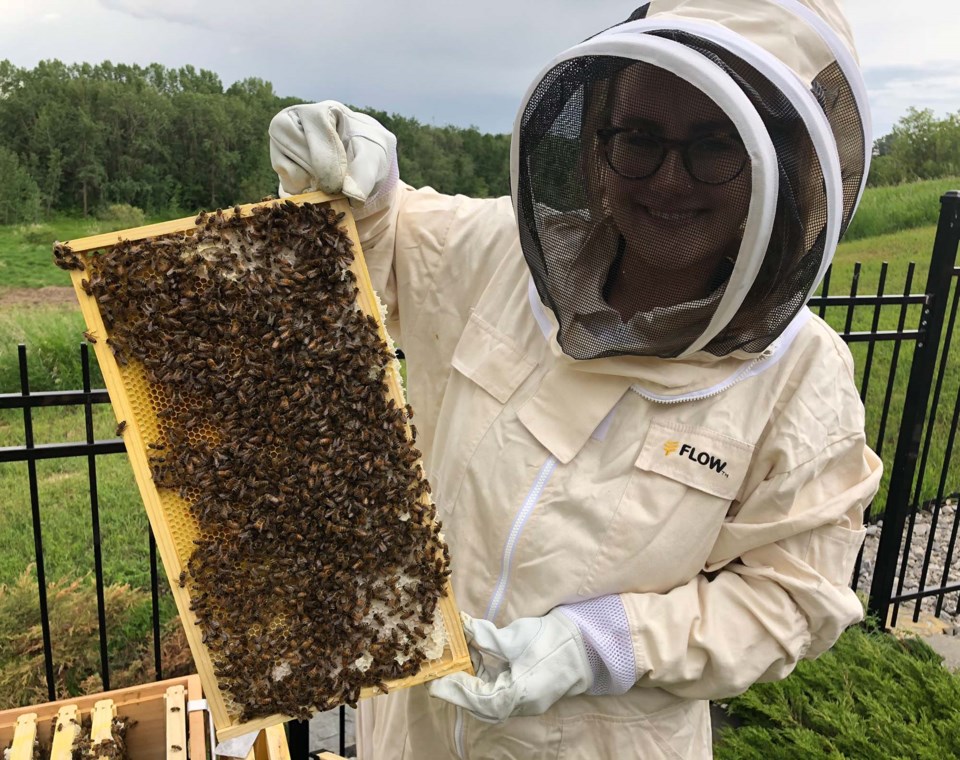Global heating could mean less honey and higher costs for Alberta beekeepers, say experts who are set to attend a conference this week.
Hundreds of Alberta farmers will be at Edmonton’s Fantasyland Hotel on Nov. 25 to Nov. 26 for the 2021 Alberta Beekeepers Commission conference to discuss the latest trends in beekeeping. Topics include bee genetics, robot beekeepers, and the varroa mite — an insidious pest that for many years has been one of the top killers of Alberta honeybees.
Hovering in the background of the conference is this past summer’s record heat, which scorched canola crops and forced bees to collect water for cooling instead of nectar for honey.
Some keepers had to haul in drums full of water to hydrate their bees, said Rod Scarlett, executive director of the Canadian Honey Council — an unheard of and expensive practice in Alberta.
The high heat also encouraged high bee and thereby varroa mite reproduction, said Jeremy Olthof, president of the Alberta Beekeepers Commission.
“The mite population just exploded.”
Climate warming means more extreme heat and drought in the years ahead, said JC Cahill, a professor of plant ecology at the University of Alberta and speaker at the conference.
“Drought causes plants to make less flowers and the flowers are smaller, and bees don’t like them. You also have less nectar,” he said.
“Pretty much everything you don’t want to happen is happening with drought.”
Heat impacts
About 75 per cent of Alberta’s honey comes from canola, and canola stops producing flowers at 30 C, Cahill said. The summer’s heat resulted in fewer canola flowers, which appears to have caused bees to turn to more drought-tolerant, weedier species instead.
Beekeepers suspect this shift in behaviour may explain why this year’s honey was darker than usual, Scarlett said. The heat itself also appears to have sapped honey production, with initial estimates finding a 20-per-cent drop in this year’s harvest.
This colour-change could be a problem if it persists, Olthof said.
“Canadian honey is known as the canola honey,” he said, and it’s known for its light colour.
“If we started going consistently darker, we would probably lose a lot of markets.”
Last summer’s heat led to more complaints from homeowners about bees using their hot tubs as watering holes, Olthof said. There were also rumours the recent floods in B.C. (caused by extreme weather, which climate change makes more likely) may have destroyed many overwintering hives from Alberta.
The Climate Atlas of Canada suggests the Edmonton region could see six to eight more days of very hot weather (+30 C) by 2050, in addition to more and longer heat waves (periods of +30 C temperatures) and higher peak temperatures (about 33 C, compared to about 31 C in the recent past).
As all forecasts predict more extreme heat in Alberta’s future, Cahill said this could make this province inhospitable to canola.
“You might have to change what you plant.”
Seed companies are working on more heat-tolerant strains of canola, but it’s unclear if bees would be attracted to them, Scarlett said. Olthof said Albertans might have to adapt Californian practices for cooling (such as painting hives white) if hot temperatures continue.
Olthof said he was hoping for a tonne of snow this winter to prevent a repeat of last summer. Still, with high varroa mite numbers in most hives, few pesticides available, and the pandemic restricting shipments of replacement bees, he predicts heavy losses this winter.
“I think it’s going to be a bad spring,” he said.
Tickets to the conference are available at the door. Visit albertabeekeepers.ca for details.




